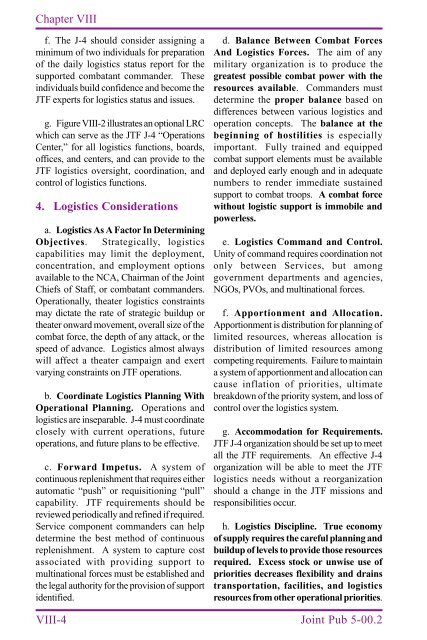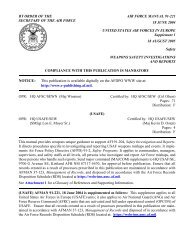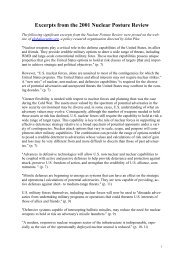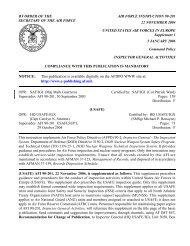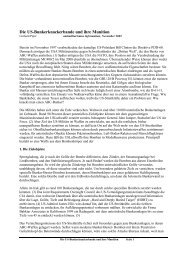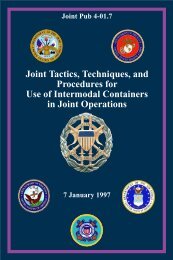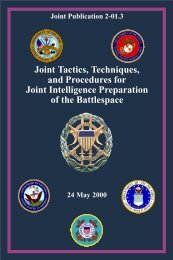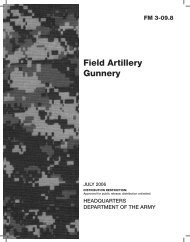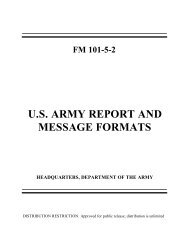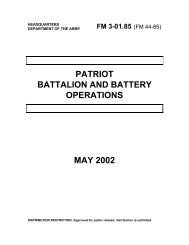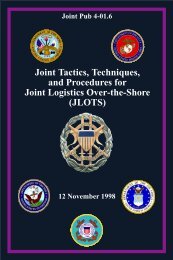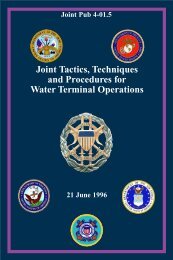Joint Pub 5-00.2 Joint Task Force Planning Guidance and ... - BITS
Joint Pub 5-00.2 Joint Task Force Planning Guidance and ... - BITS
Joint Pub 5-00.2 Joint Task Force Planning Guidance and ... - BITS
You also want an ePaper? Increase the reach of your titles
YUMPU automatically turns print PDFs into web optimized ePapers that Google loves.
Chapter VIII<br />
f. The J-4 should consider assigning a<br />
minimum of two individuals for preparation<br />
of the daily logistics status report for the<br />
supported combatant comm<strong>and</strong>er. These<br />
individuals build confidence <strong>and</strong> become the<br />
JTF experts for logistics status <strong>and</strong> issues.<br />
g. Figure VIII-2 illustrates an optional LRC<br />
which can serve as the JTF J-4 “Operations<br />
Center,” for all logistics functions, boards,<br />
offices, <strong>and</strong> centers, <strong>and</strong> can provide to the<br />
JTF logistics oversight, coordination, <strong>and</strong><br />
control of logistics functions.<br />
4. Logistics Considerations<br />
a. Logistics As A Factor In Determining<br />
Objectives. Strategically, logistics<br />
capabilities may limit the deployment,<br />
concentration, <strong>and</strong> employment options<br />
available to the NCA, Chairman of the <strong>Joint</strong><br />
Chiefs of Staff, or combatant comm<strong>and</strong>ers.<br />
Operationally, theater logistics constraints<br />
may dictate the rate of strategic buildup or<br />
theater onward movement, overall size of the<br />
combat force, the depth of any attack, or the<br />
speed of advance. Logistics almost always<br />
will affect a theater campaign <strong>and</strong> exert<br />
varying constraints on JTF operations.<br />
b. Coordinate Logistics <strong>Planning</strong> With<br />
Operational <strong>Planning</strong>. Operations <strong>and</strong><br />
logistics are inseparable. J-4 must coordinate<br />
closely with current operations, future<br />
operations, <strong>and</strong> future plans to be effective.<br />
c. Forward Impetus. A system of<br />
continuous replenishment that requires either<br />
automatic “push” or requisitioning “pull”<br />
capability. JTF requirements should be<br />
reviewed periodically <strong>and</strong> refined if required.<br />
Service component comm<strong>and</strong>ers can help<br />
determine the best method of continuous<br />
replenishment. A system to capture cost<br />
associated with providing support to<br />
multinational forces must be established <strong>and</strong><br />
the legal authority for the provision of support<br />
identified.<br />
VIII-4<br />
d. Balance Between Combat <strong>Force</strong>s<br />
And Logistics <strong>Force</strong>s. The aim of any<br />
military organization is to produce the<br />
greatest possible combat power with the<br />
resources available. Comm<strong>and</strong>ers must<br />
determine the proper balance based on<br />
differences between various logistics <strong>and</strong><br />
operation concepts. The balance at the<br />
beginning of hostilities is especially<br />
important. Fully trained <strong>and</strong> equipped<br />
combat support elements must be available<br />
<strong>and</strong> deployed early enough <strong>and</strong> in adequate<br />
numbers to render immediate sustained<br />
support to combat troops. A combat force<br />
without logistic support is immobile <strong>and</strong><br />
powerless.<br />
e. Logistics Comm<strong>and</strong> <strong>and</strong> Control.<br />
Unity of comm<strong>and</strong> requires coordination not<br />
only between Services, but among<br />
government departments <strong>and</strong> agencies,<br />
NGOs, PVOs, <strong>and</strong> multinational forces.<br />
f. Apportionment <strong>and</strong> Allocation.<br />
Apportionment is distribution for planning of<br />
limited resources, whereas allocation is<br />
distribution of limited resources among<br />
competing requirements. Failure to maintain<br />
a system of apportionment <strong>and</strong> allocation can<br />
cause inflation of priorities, ultimate<br />
breakdown of the priority system, <strong>and</strong> loss of<br />
control over the logistics system.<br />
g. Accommodation for Requirements.<br />
JTF J-4 organization should be set up to meet<br />
all the JTF requirements. An effective J-4<br />
organization will be able to meet the JTF<br />
logistics needs without a reorganization<br />
should a change in the JTF missions <strong>and</strong><br />
responsibilities occur.<br />
h. Logistics Discipline. True economy<br />
of supply requires the careful planning <strong>and</strong><br />
buildup of levels to provide those resources<br />
required. Excess stock or unwise use of<br />
priorities decreases flexibility <strong>and</strong> drains<br />
transportation, facilities, <strong>and</strong> logistics<br />
resources from other operational priorities.<br />
<strong>Joint</strong> <strong>Pub</strong> 5-<strong>00.2</strong>


